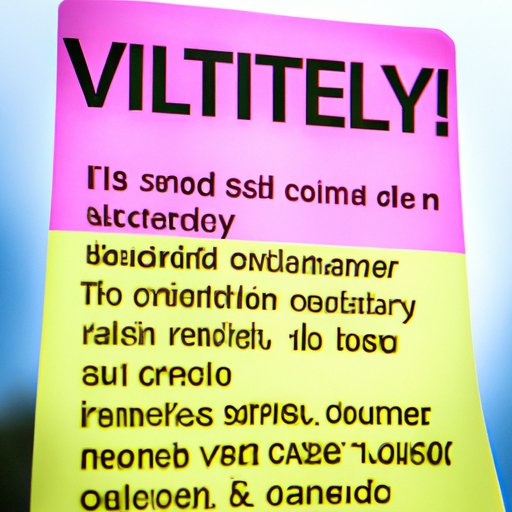Introduction: Exploring the Definition and Pros and Cons of Cancel Culture
Cancel culture is a phenomenon that has become increasingly prominent in recent years. It refers to the practice of publicly denouncing someone’s actions or words, often involving intense criticism from the public and the use of social media to spread the message. While some view cancel culture as a way to hold people accountable for their words and actions, others see it as an overreaction to mistakes and a violation of due process.
Examining the Pros of Cancel Culture
The main argument for cancel culture is that it holds people accountable for their words and actions. This is especially relevant in today’s world, where many individuals are in positions of power and influence who may not be held responsible for their behavior. Cancel culture gives those who are wronged a platform to speak out and be heard, which can lead to greater accountability.
In addition, cancel culture can create a more equitable society by putting pressure on those in power to change their behavior. By highlighting injustices and inequalities, it can bring attention to social issues and encourage people to take action. In this way, it can help create a more just and inclusive world.

Examining the Cons of Cancel Culture
On the other hand, there are several drawbacks to cancel culture. One of the main criticisms is that it leads to overreaction to mistakes, as people are quick to judge and condemn without considering the context or giving the person a chance to explain themselves. This can lead to a lack of due process, as decisions are made without giving the accused an opportunity to defend themselves.
In addition, cancel culture can lead to a culture of fear, as people are afraid to speak out or express their opinions for fear of being “canceled.” This can stifle creativity and open dialogue, making it difficult for meaningful conversations to take place.

How Cancel Culture is Impacting Society
Cancel culture has had a significant impact on society. It has increased awareness of social issues and encouraged people to speak up about injustices and inequalities. Many have even credited cancel culture with sparking movements such as Black Lives Matter and #MeToo.
In addition, cancel culture has had an influence on politics, as politicians are increasingly being held accountable for their words and actions. This has led to more scrutiny of political candidates and increased pressure for them to address important issues.
Exploring the Benefits and Drawbacks of Cancel Culture
Cancel culture can be both beneficial and detrimental to society. On the one hand, it can strengthen communities by providing a platform for those who have been wronged to speak out and be heard. This can lead to greater accountability and a more equitable society.
However, it can also fuel divisiveness by creating an atmosphere of fear and mistrust. Those who disagree with the views of the “cancelers” may be reluctant to speak out, leading to a lack of constructive dialogue and a polarized society.

Analyzing the Effects of Cancel Culture on Social Change
Cancel culture has also had an effect on social change, both positive and negative. On the one hand, it has empowered marginalized groups by giving them a platform to speak out against injustices and inequalities. On the other hand, it has created a toxic environment in which people are afraid to express their views for fear of being “canceled.”

Investigating the Role of Cancel Culture in Shaping Our World
In conclusion, cancel culture has both benefits and drawbacks. While it can be an effective tool for holding people accountable and creating a more equitable society, it can also lead to a culture of fear and divisiveness. Ultimately, it is up to each of us to decide how we want to use cancel culture and what role we want it to play in shaping our world.
Conclusion
In summary, cancel culture can be a powerful tool for holding people accountable and creating a more equitable society. However, it can also lead to overreaction to mistakes, a lack of due process, and a toxic environment. It is up to us to decide how we want to use cancel culture and whether it is ultimately good or bad for society.
(Note: Is this article not meeting your expectations? Do you have knowledge or insights to share? Unlock new opportunities and expand your reach by joining our authors team. Click Registration to join us and share your expertise with our readers.)
